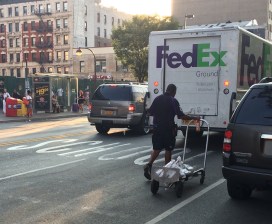The Parking Dysfunction Meter: Fines Are Five Times Revenue

More enduring than Big Foot, the Loch Ness Monster and the resurrection of Elvis is the deeply held belief that there is such a thing as "free" parking for the average motorist in New York City. "Free" means you do not have to pay.
But someone is paying the $579,455,152 in parking fines the city expects to collect this year, according to the Mayor’s supplemental budget — and it’s not just Fed Ex and UPS. Together, those companies pay about $30 million in NYC parking fines, or just over five percent.
Meanwhile, the city expects to collect $112,248,000 from meters in 2007. This more than five-to-one ratio of fines to meter revenue may very well be the ultimate measure of the dysfunction of New York City’s on-street parking policies. Why?
The revenue the city raises from parking violations does little to solve
traffic and transportation problems. Many parking tickets are penalty
fees imposed on motorists who for one reason or another need to park their car for a moment but simply can’t find a legal spot (double-parking on Brooklyn’s 9th Street, for example).
In contrast, special loading zones and higher meter rates encourage more parking space turn-over, thus freeing up more curbside space
and reducing wasteful cruising. This means less traffic, less double-parking and
fewer delays to buses, all of which adds up to reductions of billions of
dollars in economic and environmental costs.
When you start looking at the parking problem this way, the choice becomes clear for New York City motorists: A few dollars more for on-street parking vesus a $115 double-parking fine. So, when you hear a
motorist call higher meter rates "unfair," ask them what’s fair about
paying more than half a billion a year in parking fines and still not
getting a place to park — unless, of course, you have a government-issued parking placard. In which case, none of the above applies to you.
Photo: DM.nyc on Flickr

